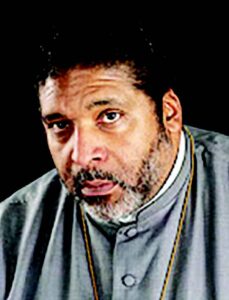U.S. Senate’s failure in passing Voting Rights hurts N.C.
By Cash Michaels, Peacemaker Senior Contributor / January 27, 2022Bishop William Barber doesn’t see the U.S. Senate’s filibuster just as a mechanism to thwart the passage of important voting rights legislation, as happened last week when two moderate Democratic senators joined with 50 Republicans to vote against changing the rules. He sees it as a tool against helping poor people of all colors achieve the economic and civil rights justice they have long been historically denied.
“We should’ve never had a separation of [Pres. Biden’s] infrastructure bill, Build Back Better and voting rights,” Bishop Barber told reporters recently while promoting the national Poor People’s Campaign’s Mass Poor People and Low-Wage Workers’ Assembly and Moral March on Washington and to the Polls on June 18th. “We should’ve recognized that the infrastructure of our democracy [is also vital].”As many present-day observers agree, Bishop Barber is often compared to 1960s’ civil rights leader Dr. Martin Luther King Jr. because of his outspoken opposition to civil injustice. So it is no surprise that King, whose birthday and holiday the nation commemorated last week, also once criticized the U.S. Senate’s filibuster rule of requiring 60 votes when, in the opinion of many, a simple majority of 100 senators should be all that’s needed.
“I think the tragedy is that we have a Congress, with a Senate, that has a minority of misguided senators who will use the filibuster to keep the majority of people from even voting,” Dr. King is seen saying during video of a 1963 press conference.
Almost 60 years later, it was Dr. King’s eldest son, Martin III, who blasted Senate Republicans plus moderate Democrats Joe Manchin (D-WVa) and Kyrsten Sinema (D-Az) for not voting to change the filibuster rules to allow passage of voting rights legislation.
“History will not remember them kindly,” King III told marchers in the nation’s capitol last week.
The repeated failure of the Democrat-led Senate to pass meaningful voting rights legislation this session of Congress (the Democratic majority in the House has passed it) means that for North Carolina, unless the 4-3 Democrat majority on the N.C. Supreme Court rules otherwise, the voting districts redrawn by N.C. Republican legislative leaders for N.C. congressional and legislative races will not only maintain a lopsided GOP majority in the state for the next ten years, but will do so at the cost of current Black elected representation.
According to an analysis by the nonprofit, nonpartisan Brennan Center for Justice, the new redistricting by Republicans in the state legislature does African American voters in North Carolina no favors.
The new [congressional] district configuration eliminates one of the state’s two majority-minority districts and packs nonwhite population into the other one. A third district that was close to being majority nonwhite now has fewer people of color. The other districts largely see major population centers divided up in ways that do not follow community lines or natural geographic boundaries. Wake, Mecklenburg, and Guilford Counties, all home to sizeable communities of color, are each split across three separate districts under the new plan. And Forsyth and Guilford Counties are broken apart, suggesting an effort to diminish the influence of Black voters in and around the city of Greensboro, echoing maps from last decade that were found to violate the state constitution.How this First Congressional District has been redrawn, for instance, is the same reason why Congressman G. K. Butterfield, a veteran African American Democrat, has announced that he is stepping down after nine terms in office.
Per the legislative maps, at least two Black incumbent Democrat state senators in eastern North Carolina – Ernestine Bazemore from Bertie County, and veteran state Sen. Milton “Toby” Fitch of Wilson – have no chance of winning reelection in their newly drawn districts, according to an analysis by UCLA political scientist Jeffrey B. Lewis in recent court testimony.
It wasn’t always this way.
Section 5 of the VRA prevented states with a history of voting rights discrimination, like North Carolina, from implementing any changes to its elections or redrawing of its voting districts without “pre-clearance” from the U.S. Justice Dept. first.
But in 2013, the U.S. Supreme Court threw out Section 5, freeing North Carolina and other southern states from that requirement, thus opening a virtual Pandora’s Box of questionable redistricting and voting changes that now threaten fair elections in North Carolina and elsewhere, critics say.
The voting rights legislation that today’s U.S. Senate has failed to pass would have restored the Section 5 VRA requirements, and protected communities of color. Senate Democrats’ failure means North Carolina Democrats and progressive groups have to fight Republican efforts step by step.
In anticipation of a state High Court ruling that the new maps are illegal gerrymanders, the Republican-led N.C. General Assembly last week voted to further postpone this year’s political primaries from May 17 – the date primaries were originally moved to by the three-judge panel when they were postponed from March 8 – to a much-later June 7, in order to give themselves enough time to re-redraw the maps if so ordered by the N.C. Supreme Court.
Republicans do not want the N.C. Supreme Court redrawing the maps once the Court takes the case on Feb. 2nd, or having them redrawn without GOP input. If that happens, those maps will govern the 2022 elections, and beyond.
But that’s exactly what Democrats want, which is why they opposed the June 7th measure. Democrats have already gotten signals that Gov. Roy Cooper may veto the measure.
On Jan. 21st, Gov. Cooper had joined with state Attorney Gen. Josh Stein in filing an amicus brief “…urging the Court to ensure that state elections are conducted under fair maps that are free from partisan gerrymandering.”
“The trial court recognized what has been obvious all along, that the legislative and congressional maps were intentionally gerrymandered.” said Governor Cooper. “That’s wrong and unconstitutional because it strips voters of their voice and power in our democracy.”









